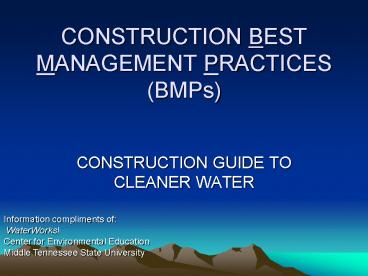CONSTRUCTION BEST MANAGEMENT PRACTICES (BMPs) PowerPoint PPT Presentation
1 / 43
Title: CONSTRUCTION BEST MANAGEMENT PRACTICES (BMPs)
1
CONSTRUCTION BEST MANAGEMENT PRACTICES (BMPs)
- CONSTRUCTION GUIDE TO CLEANER WATER
Information compliments of WaterWorks! Center
for Environmental Education Middle Tennessee
State University
2
Protect Natural Features
- Minimize the amount of exposed soil and the
extent of clearing. - Identify and protect areas where existing
vegetation, such as, trees, will not be disturbed
by construction activity.
3
(No Transcript)
4
(No Transcript)
5
(No Transcript)
6
(No Transcript)
7
(No Transcript)
8
(No Transcript)
9
(No Transcript)
10
- Minimize compaction of soil by limiting heavy
equipment use to specific areas. - Restore any damaged areas.
11
- Protect streams, stream buffers, wild woodlands,
wetlands, or other sensitive areas for,
disturbance by fencing or otherwise clearly
marking these areas.
12
Construction Phasing
- Sequence construction activities so that the soil
is not exposed for long periods of time. - Limit grading to small areas.
13
(No Transcript)
14
(No Transcript)
15
Install key sediment control practices before
site grading, such as silt fences (Be sure to
entrench the fence about 6 inches into dirt
remove sediment when it reaches ½ the height of
the fence).
16
(No Transcript)
17
(No Transcript)
18
(No Transcript)
19
(No Transcript)
20
(No Transcript)
21
Schedule site stabilization activities, such as
landscaping, to be completed immediately after
the land has been graded to its final contour.
22
Plant Vegetative Buffers
- Protect and install vegetative buffers along
water bodies to slow and filter storm water
runoff. - Maintain buffers by replanting if needed.
23
Site Stabilization
- Apply temporary stabilization to rough-graded
areas. - Plant, mulch or otherwise stabilize all exposed
areas as soon as land alterations have been
completed.
24
(No Transcript)
25
(No Transcript)
26
Protect Storm Drain Inlet
- Use appropriate controls to prevent sediment,
debris and trash from entering storm water
system. - If you use inlet filters, maintain them regularly.
27
(No Transcript)
28
(No Transcript)
29
(No Transcript)
30
Dirt Stockpiles
- Cover or seed all dirt stockpiles
- Surround dire stockpiles with silt fence
31
(No Transcript)
32
Prevent Erosion
- Terrace Slopes
- Break up long slopes with sediment barriers or
divert storm water away from slopes
33
(No Transcript)
34
(No Transcript)
35
(No Transcript)
36
Plan Construction Entrances
- Utilize construction exits to minimize vehicle
tracking of mud and dirt offsite. - Use properly sized entrances for all anticipated
vehicles. - Use geotextile beneath entrance along with 2 to
3 gravel.
37
(No Transcript)
38
Maintain Your BMPs
39
(No Transcript)
40
(No Transcript)
41
(No Transcript)
42
(No Transcript)
43
A Little Effort Makes a Big Difference
BEFORE
AFTER

